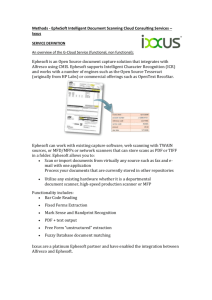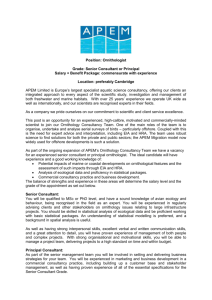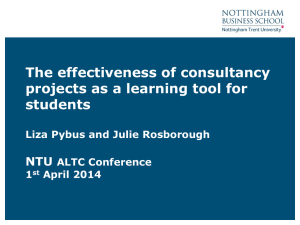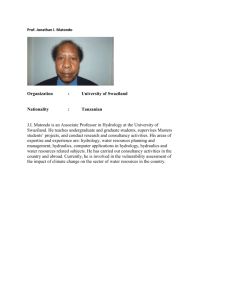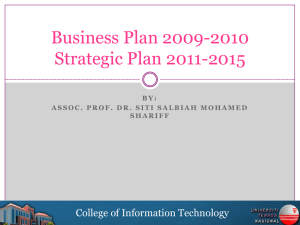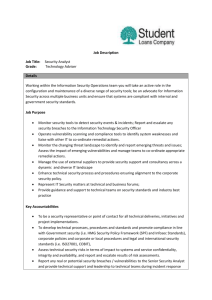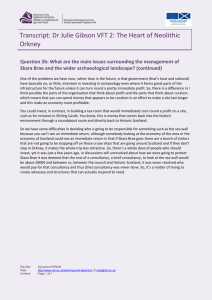Consultancy Guidelines - University of Sheffield
advertisement
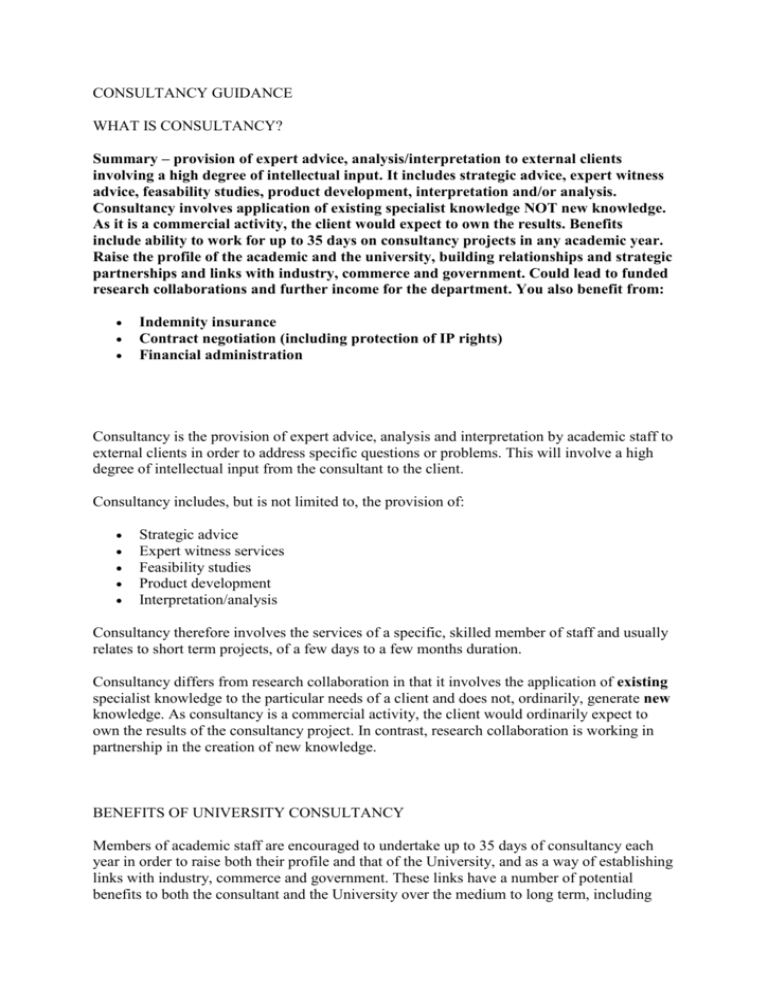
CONSULTANCY GUIDANCE WHAT IS CONSULTANCY? Summary – provision of expert advice, analysis/interpretation to external clients involving a high degree of intellectual input. It includes strategic advice, expert witness advice, feasability studies, product development, interpretation and/or analysis. Consultancy involves application of existing specialist knowledge NOT new knowledge. As it is a commercial activity, the client would expect to own the results. Benefits include ability to work for up to 35 days on consultancy projects in any academic year. Raise the profile of the academic and the university, building relationships and strategic partnerships and links with industry, commerce and government. Could lead to funded research collaborations and further income for the department. You also benefit from: Indemnity insurance Contract negotiation (including protection of IP rights) Financial administration Consultancy is the provision of expert advice, analysis and interpretation by academic staff to external clients in order to address specific questions or problems. This will involve a high degree of intellectual input from the consultant to the client. Consultancy includes, but is not limited to, the provision of: Strategic advice Expert witness services Feasibility studies Product development Interpretation/analysis Consultancy therefore involves the services of a specific, skilled member of staff and usually relates to short term projects, of a few days to a few months duration. Consultancy differs from research collaboration in that it involves the application of existing specialist knowledge to the particular needs of a client and does not, ordinarily, generate new knowledge. As consultancy is a commercial activity, the client would ordinarily expect to own the results of the consultancy project. In contrast, research collaboration is working in partnership in the creation of new knowledge. BENEFITS OF UNIVERSITY CONSULTANCY Members of academic staff are encouraged to undertake up to 35 days of consultancy each year in order to raise both their profile and that of the University, and as a way of establishing links with industry, commerce and government. These links have a number of potential benefits to both the consultant and the University over the medium to long term, including building relationships with external organisations which may lead to strategic partnerships and other benefits such as funded research collaborations, applying skills/expertise in a different way can lead to new perspectives and ideas for the consultant, opportunities for knowledge and expertise to make an impact on industry or society, raising the profile of the consultant and University with external customers. Consultancy is also a source of additional income for the academic or their department. By undertaking University consultancy, as opposed to private consultancy, academic staff will benefit from the following support: Indemnity insurance Contract negotiation (including protection of IP rights) Financial administration PROCESS Summary: 1. Project Initiation. The identification of an opportunity, or an approach from a proposer should always be discussed with RIS before agreement. Costing form completion required (see link to form below) 2. Project approval, budgets agreed with HoD, contractual terms and conditions. R&IS will consider indemnity, IP, controversy and conflicts of interest 3. Project Completion. After sign off by RIS and client, work can begin. It is advisable not to start work until the contracts have been signed. After completion of the work, a consultancy completion form (see link below) can be completed. It is only after the consultancy work has been completed can the fee be claimed. Stage 1: Project Initiation Identification of consultancy opportunity Consultancy projects are usually identified by individual members of academic staff through their own contacts with industry, commerce or government. However, projects may also be client-led, through enquiries by organisations seeking access to University expertise. An informal discussion with R&IS at this early stage may be useful in identifying any potential issues and clarifying next steps. Costing and Proposal Form You will need to complete an online Costing and Proposal Form as part of which it is important that you provide a clear but concise description of the proposed project together with the information needed to accurately cost the project. R&IS will confirm receipt of your submission by email. Existing client contracts In some instances, as a result of early discussions with the client regarding a potential project, the client may have provided you with a contract. You should forward this to R&IS as it will need to be reviewed (and signed) within R&IS, to ensure the client's terms and conditions are acceptable. Stage 2: Project Approval Budget approval Based on the information in the Costing and Proposal Form, R&IS will send you a budget proposal form. This will need to be approved by you and your Head of Department. In doing so, each of you will be agreeing (i) the proposed budget (ii) that the proposed consultancy will not commit the University to any additional costs (iii) that the consultancy will be carried out in accordance with HR guidelines. In addition, your Head of Department will be agreeing to you undertaking the consultancy (this is a requirement of all consultancy by University staff). Consideration of indemnity, IP, controversy and conflict of interest R&IS will consider indemnity, IP, controversy and conflicts of interest relating to the proposed activity, and liaise with other professional services in ensuring that both you and the University are appropriately protected. In particular, consideration will be given to whether: The proposed project involves activities that are not be covered by the University's existing insurance. The costs of special insurance may need to be added to the project costs. Special arrangements are needed in respect of IP; any IP arising from consultancy contracts is ordinarily owned by the client. Any elements of the proposed project may be considered controversial and thereby pose a risk to your reputation or that of the University. There are any conflicts of interest which may, or appear to, impair the independence of your consultancy. If any of the above apply, R&IS will advise you accordingly. Negotiation and agreement of consultancy contract R&IS will generate a contract relating to your consultancy project, based either on the University's standard consultancy contract, or on a contract issued by your client. It is important to realise that: As the University's standard contract includes standard terms and conditions, R&IS will ordinarily be able to generate a contract and progress to 'sign off' quickly. As client contracts may include non-standard terms and conditions, they will require detailed scrutiny and may necessitate negotiation between you, the client and R&IS. The terms that frequently require discussion are those relating to ownership and access to existing IP, confidentiality, publication, insurance and warranties and termination. This may delay the agreement of the consultancy contract and thereby the start of the project. In either case, R&IS will ensure that the contract reflects the agreed budget and covers the contractual issues described above. Consultancy contract sign-off R&IS will send the agreed contract to the client, and an authorised member of R&IS will act as signatory for the University. Once the contract has been signed off by both the University and the client, the project can start. Stage 3: Project Completion Project start When the contract has been signed off by both the University and the client, the project can start. Work must not begin prior to this as, in the absence of a signed contract, there is no formal agreement to pay the agreed fee. Additionally, you and the University may be exposed to financial and/or reputational risk should problems arise. Invoicing of client The contract will include an invoicing schedule against which University Finance will issue invoices to the client. Ad hoc invoices may also be raised against additional agreed activity/expenditure, if necessary. If no set payment schedules are included then invoicing will be carried out upon completion of the work. Project closure Once you have completed the consultancy work, you will need to complete a Consultancy Completion Form and return this to R&IS (form available as a download to the right of this page). Any outstanding costs will then be invoiced and the project will be formally closed. DIAGRAMMATICAL REPRESENTATION OF THE PROCESS PRIVATE CONSULTANCY In this case the contract is between the individual and the client, with no University involvement. The member of staff may not use the University name or facilities and must not make representations that they are acting on behalf of the University. The individual concerned shall be entirely responsible for the following: negotiating contracts; arranging professional indemnity insurance; financial management ensuring that the appropriate private consultancy form is signed by the Head of the Department acknowledging that the member of staff is not working on behalf of the University. Income and expenditure in respect of non-University business, including private consultancies, must not be processed through the University´s accounts. CONCLUDING KEY FACTS TO REMEMBER 1. It is important to note that the consultancy account (X/……) must only be used to run the costs of the consultancy work. It cannot be used as source of funds for purposes other than the agreed work. 2. Once the work is completed, RIS will invoice for the costs incurred and also the agreed fee. The fee may be paid directly to the PI ‘s bank account via payroll or waived to the department. At HoDs discretion, the waived fee will be returned to the PI cost centre (old DF a/c) but must be used within the financial year it is credited. 3. Academics may obtain payment for up to 35 days in any academic year. (inc University employed Hon Clin Staff). These 35 days are inclusive of private and departmental consultancy. 4. The first £5,000 gross of consultancy will not incur a university overhead. After this 12.5% is charged on all income received. The department of Oncology has agreed that 10% of the fee will be retained at dept level. 5. Please be cautious when approached by a potential sponsor that the offer of £x, if accepted by you informally as a fee, will include VAT, dept contribution, uni contribution etc. so always ensure that the fee is enough. It is always important to involve RIS/department when negotiating fees/costs. FURTHER READING RIS Consultancy Guidance: http://www.shef.ac.uk/ris/other/consultancy UoS Financial Regulations (Consultancy) http://www.shef.ac.uk/finance/regulations/leveltwo/consultancy UoS H/R Consultancy Guidance: http://www.shef.ac.uk/hr/guidance/academicstaff/consultancy.html Consultancy Costing and Proposal Form: http://www.shef.ac.uk/ris/other/consultancy/form Consultancy Completion Form: http://www.shef.ac.uk/ris/other/consultancy/completed Private Consultancy Form: http://www.shef.ac.uk/polopoly_fs/1.89791!/file/Private-Consultancy-form.pdf Effective Consultancy for Academics http://www.shef.ac.uk/ris/other/consultancy/effectiveconsultancy Consultancy FAQs http://www.shef.ac.uk/ris/other/consultancy/faq Consultancy Finance Contact: Lauren Gedeon ext 21458 (l.gedeon@shef.ac.uk)
